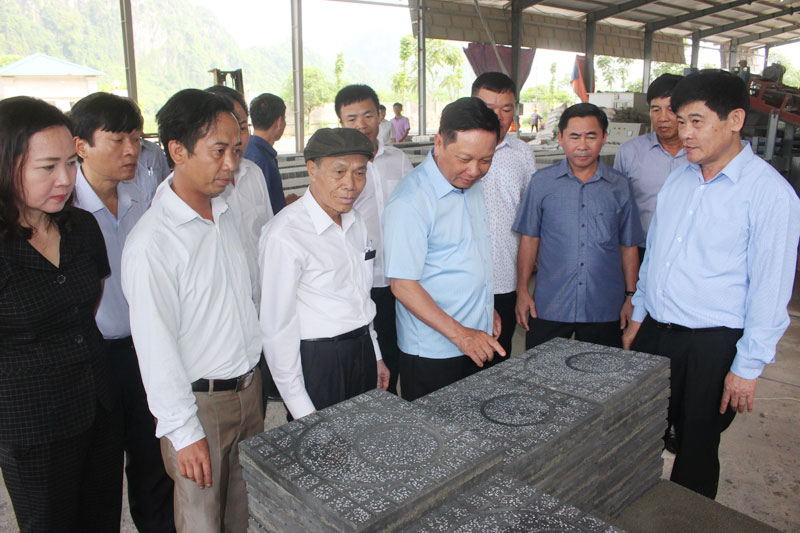
(HBO) – Secretary of the Hoa Binh provincial Party Committee Bui Van Tinh recently made a fact-finding tour of the stone carving village in Phu Thanh commune, Lac Thuy district, and a baking-free brick factory in Yen Thuy district. He was accompanied by Nguyen Van Dung, Vice Chairman of the provincial People’s Committee.

Secretary of the Hoa Binh provincial Party Committee
Bui Van Tinh visits and learns about the baking-free brick production of the
Nam Son Co. Ltd in Doan Ket commune, Yen Thuy district.
The stone carving village in Phu Thanh commune
was established in December 2016. Thirty local households have taken part in
stone carving activities. The craft creates stable jobs for more than 100
people who earn an average per capita income of 10 million VND (440 USD) each
month.
Meanwhile, the non-baked brick and floor tile
production line of the Nam Son Co. Ltd began operating in 2015 and has a designed
capacity of 1 million bricks per year, providing jobs for over 40 people with
monthly per capita income of 4.5 – 5 million VND (198 – 220 USD).
Secretary Bui Van Tinh highly valued activities
of the stone carving village in Phu Thanh commune, asking the administration of
Lac Thuy district and relevant departments and sectors to boost communication
activities to make the village and its products widely known.
Meanwhile, the banking-free brick and floor tile
production of the Nam Son Lo. Ltd, which also plans to make artificial sand, is
a new model that needs to be enhanced, he said, asking the firm to diversify
products, ensure occupational safety and health, prevent fire and explosion,
and protect the environment.
The provincial People’s Committee will issue
mechanisms to encourage the production and sale of artificial sand, he noted.
Regarding the production and consumption of
agricultural products, the official told Yen Thuy authorities to base on its
soil conditions to re-zone off farming areas in association with the preservation,
processing, sale and future export of local agricultural products. He also
requested stronger examination and management of contracts for production and
consumption cooperation to ensure legitimate interests of both businesses
Hoa Binh province is undergoing a dynamic transformation amid Vietnam’s national digital transition. Building on Poliburo’s Resolution No. 57-NQ/TW on breakthroughs in science, technology, innovation, and national digital transformation, the province has rolled out a wide range of practical action plans. A standout initiative is the "Digital Literacy for All” movement, an effort to ensure that no one is left behind in the digital era.
Hoa Binh province is undergoing a dynamic transformation in the wake of the national digital transformation movement. Building on Resolution No. 57-NQ/TW of the Politburo on breakthroughs in science, technology, innovation, and national digital transformation, the province has implemented a wide range of practical action plans. A standout initiative is the "Digital Literacy for All” movement ambitious effort to ensure that no one is left behind in the digital age.
With a spirit of unity and proactive problem-solving, the Party Committee, the government and the people of Dong Lai Commune (Tan Lac District) have made great strides in implementing the resolutions of the 24th Party Congress of the commune for the 2020 - 2025 term. Focusing on leadership and practical actions, the commune has brought the Party’s resolutions into daily life, creating strong impacts and pushing the local development forward.
Amid the nationwide push for digital transformation, young people in Hoa Binh Province are stepping up as dynamic pioneers, applying technology to enhance Youth Union operations and expand the reach of youth-led initiatives. Through creativity and adaptability, Youth Union organizations at all levels have introduced a series of practical solutions, contributing to modern governance and community development.
In recent years, An Nghia commune, located in Lac Son district, has stepped up administrative reform, focusing on improving the quality and efficiency of its single-window service unit for receiving and processing administrative procedures. These improvements have helped create favourable conditions for local residents and organisations to handle administrative procedures, contributing to the commune’s broader socio-economic development.
The Prime Minister-approved master plan to develop the multi-use value of forests ecosystems through 2030, with a vision to 2050, aims to improve the management and sustainable use of forest resources, create jobs, increase incomes, and improve the living standards of ethnic minorities, people in mountainous and remote areas, forest workers and those living near forests.



